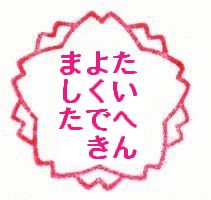
This is the stamp you get for 'good work' at elementary schools.
アンサータイムです!
1. そのTシャツ、カッコいいじゃない!
Affirmative. "That T-shirt looks so cool!"
The negative form of 「カッコいい」 is 「カッコよくない」; therefore, 「カッコいいじゃない」 is always affirmative regardless of the context. This can be said about all "i-adjectives". 「大きいじゃない」 always means "(Something) is big!"
2. ダメじゃない、そんな事したら!
Affirmative. "It is no good to do such a thing." or "Don't do a thing like that!"
It may look like it is negative because the translations include the words "no" and "not", but the word 「ダメ」 already means "no good", so 「じゃない」 is being used affirmatively here.
However, unlike in #1, 「ダメじゃない」 can be used negatively depending on the context.
Kid: 「今日9時からテレビで映画見たらダメ?」 = "If I watch a movie on TV starting at 9 today, is that ダメ?"
Dad: 「ダメじゃないよ。いいよ。明日学校休みだから� �」 = "It is not ダメ. It is OK because there is no school tomorrow."
3. ディズニーランドに行くって言ったじゃな~い!
Affirmative. "You told me we were going to Disneyland! (But you changed your mind!)"
"Verb in past tense + じゃない" is always affirmative. The negative form of 「言った」 is 「言わなかった」.
4. この車はオレのじゃないです。
Negative. "This car is not mine."
Had there been no 「です」, the phrase would have been ambiguous in its 'aff. vs. neg.' status. 「この車はオレのじゃない!」 can mean "This car is mine."
5. あの人は日本人じゃないと思う。
Negative. "I think that man is not Japanese." Please note that I am employing highly literal translations today for the explanation's sake.
Whenever 「じゃない」 is directly followed by phrases like 「と思う」, 「と感じる」, 「と聞いている」. etc., it is being used negatively.
6. なかなかやるじゃない!
Affirmative. "You are doing a good job!"
"Verb in dictionary form + じゃない" is always affirmative. The negative form of 「やる」 is 「やらない」.
7. アタシはそんな女じゃない。これだけは信じて!
Negative. "I am not that kind of woman. Please believe that at least."
Without 「これだけは信じて!」 for context, it would have been ambiguous.
8. 結婚してくれるって、あなた約束したじゃない・ ・・・
Affirmative. "You promised to marry me, n'est-ce pas!"
Refer back to #3 for explanation. The negative form of 「した」 is 「しなかった」.
9. ジョンソン君すごいじゃん。日本語ペラペラじゃ ない!
Affirmative. "Johnson, you are awsome. Your Japanese is perapera!"
Refer to #1 for explanation. The negative form of 「すごい」 is 「すごくない」.
10. 男は顔じゃない。ハートなんだっ!
Negative. "It is not the face that is important for a man. It is the heart!"
This one would have been ambiguous without 「ハートなんだっ!」.
11. おいしいじゃない、このクッキー。どこで買っ たの?
Affirmative. "This cookie is so tasty! Where did you buy it?"
Refer to #1. The negative form of 「おいしい」 is 「おいしくない」.